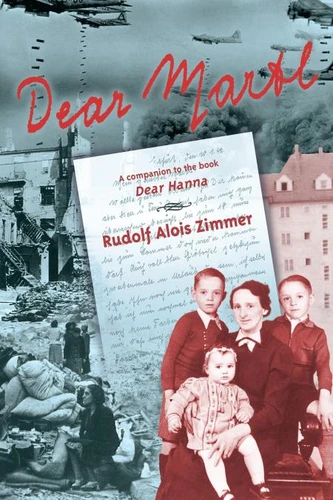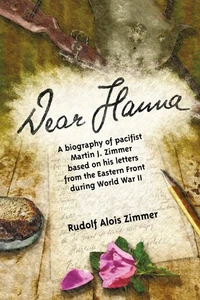Dear Martl, A companion to the book Dear Hanna
Par :Formats :
Disponible dans votre compte client Decitre ou Furet du Nord dès validation de votre commande. Le format ePub est :
- Compatible avec une lecture sur My Vivlio (smartphone, tablette, ordinateur)
- Compatible avec une lecture sur liseuses Vivlio
- Pour les liseuses autres que Vivlio, vous devez utiliser le logiciel Adobe Digital Edition. Non compatible avec la lecture sur les liseuses Kindle, Remarkable et Sony
 , qui est-ce ?
, qui est-ce ?Notre partenaire de plateforme de lecture numérique où vous retrouverez l'ensemble de vos ebooks gratuitement
Pour en savoir plus sur nos ebooks, consultez notre aide en ligne ici
- FormatePub
- ISBN978-0-9940852-8-3
- EAN9780994085283
- Date de parution03/05/2016
- Protection num.pas de protection
- Infos supplémentairesepub
- ÉditeurRudolf A. Zimmer
Résumé
Dear Martl is based on Hanna's journal and on letters she wrote to her husband, Martl, on the Eastern Front during World War II. While in Dear Hanna we see through Martl's eyes the experience of a man who has been forced to participate in a treacherous odyssey through many countries, we see in Dear Martl the trials and tribulations of an insular domestic scene on the home front. Hanna's journal describes her growing up during World War I and the working conditions during the following lean years.
She falls in love with and marries Martl. They open a café and pastry shop in 1930. With the rise of the Nazi party in 1933, they were pressured to join the Party, which for Martl's conscience as a pacifist was impossible. Thus they were subjected to harassment and boycotts of their business, which forced them to close it, leave town, and move to Erfurt, where Martl found employment. Blacklisted by the Nazi Party, Martl is called up in 1941, much too early at thirty-eight years and a father of three children.
He is marched with eighteen-to-twenty-five-year-old men to fight in Russia. Hanna's letters to her soulmate Martl are full of longing and sadness, but never despair. They deal with the struggles and anguish of women who had to deal, without the help of an extended family, with raising children and rationing life's necessities; frequent air raids; and the almost constant anxiety of losing their loved ones.
Finally, from Hanna's journal entries we learn of Martl's save return after four years of absence; the struggle to survive after the war; the extreme shortage of food and life's necessities; and the eventual rebuilding of a successful pastry business and café.
She falls in love with and marries Martl. They open a café and pastry shop in 1930. With the rise of the Nazi party in 1933, they were pressured to join the Party, which for Martl's conscience as a pacifist was impossible. Thus they were subjected to harassment and boycotts of their business, which forced them to close it, leave town, and move to Erfurt, where Martl found employment. Blacklisted by the Nazi Party, Martl is called up in 1941, much too early at thirty-eight years and a father of three children.
He is marched with eighteen-to-twenty-five-year-old men to fight in Russia. Hanna's letters to her soulmate Martl are full of longing and sadness, but never despair. They deal with the struggles and anguish of women who had to deal, without the help of an extended family, with raising children and rationing life's necessities; frequent air raids; and the almost constant anxiety of losing their loved ones.
Finally, from Hanna's journal entries we learn of Martl's save return after four years of absence; the struggle to survive after the war; the extreme shortage of food and life's necessities; and the eventual rebuilding of a successful pastry business and café.
Dear Martl is based on Hanna's journal and on letters she wrote to her husband, Martl, on the Eastern Front during World War II. While in Dear Hanna we see through Martl's eyes the experience of a man who has been forced to participate in a treacherous odyssey through many countries, we see in Dear Martl the trials and tribulations of an insular domestic scene on the home front. Hanna's journal describes her growing up during World War I and the working conditions during the following lean years.
She falls in love with and marries Martl. They open a café and pastry shop in 1930. With the rise of the Nazi party in 1933, they were pressured to join the Party, which for Martl's conscience as a pacifist was impossible. Thus they were subjected to harassment and boycotts of their business, which forced them to close it, leave town, and move to Erfurt, where Martl found employment. Blacklisted by the Nazi Party, Martl is called up in 1941, much too early at thirty-eight years and a father of three children.
He is marched with eighteen-to-twenty-five-year-old men to fight in Russia. Hanna's letters to her soulmate Martl are full of longing and sadness, but never despair. They deal with the struggles and anguish of women who had to deal, without the help of an extended family, with raising children and rationing life's necessities; frequent air raids; and the almost constant anxiety of losing their loved ones.
Finally, from Hanna's journal entries we learn of Martl's save return after four years of absence; the struggle to survive after the war; the extreme shortage of food and life's necessities; and the eventual rebuilding of a successful pastry business and café.
She falls in love with and marries Martl. They open a café and pastry shop in 1930. With the rise of the Nazi party in 1933, they were pressured to join the Party, which for Martl's conscience as a pacifist was impossible. Thus they were subjected to harassment and boycotts of their business, which forced them to close it, leave town, and move to Erfurt, where Martl found employment. Blacklisted by the Nazi Party, Martl is called up in 1941, much too early at thirty-eight years and a father of three children.
He is marched with eighteen-to-twenty-five-year-old men to fight in Russia. Hanna's letters to her soulmate Martl are full of longing and sadness, but never despair. They deal with the struggles and anguish of women who had to deal, without the help of an extended family, with raising children and rationing life's necessities; frequent air raids; and the almost constant anxiety of losing their loved ones.
Finally, from Hanna's journal entries we learn of Martl's save return after four years of absence; the struggle to survive after the war; the extreme shortage of food and life's necessities; and the eventual rebuilding of a successful pastry business and café.




